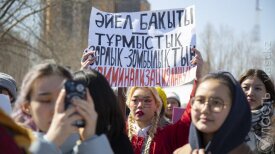Violence against women in Kazakhstan has long remained an unsolved problem.
While the country’s deputies are trying to “find a balance” on the issue of criminalizing violence against women, tragedies continue to occur in Kazakhstan. Yet, Senate Speaker Maulen Ashimbaev is confident that the current legislation is good enough for women’s protection, arguing that it is men that lack a culture of respect in relationships.
Both the country’s leadership were called to comment on the latest high-profile cases of violence against women: the murder of Saltanat Nukenova, in which her husband, ex-minister of economy Kuandyk Bishimbayev, is suspected, the rape of a resident of Taldykorgan by the head of the local police Marat Kushtybayev and the rape of a resident of Almaty, in which the bouncer of a local bar is suspected.
There are countless examples of aggression against women both in society and at the state level. Since Kazakhstan’s independence, the government has failed to implement specific measures that would truly protect women from any type of violence, be it domestic beatings or harassment on public transport.
And still today no one wants to acknowledge this epidemic of violence.
Even the draft bill “On Combating Domestic Violence,” sent by the lower chamber of parliament for revision in 2021, was not given due attention. The parliament only heard the voices of conservative activists, who equate femicide with “traditional family values”, but not those of women who were victims of violence.
The proportion of women in power is small and this hinders their opportunities to be heard - the last word always remains with men. In the parliament, for example, there are only 19 deputies in the lower chamber (less than 20%) and 11 in the Senate (20%).
Women are beaten, raped, and killed, but it is customary for a large part of society to remain silent and blame the victims for their “inappropriate behavior” or “lack of family values.” Men in Kazakh society either try to justify cruelty towards women, or simply remain silent, neglecting their responsibility to confront and discourage violent behavior among their peers.
Women who have experienced violence face are shunned everywhere: at the police station, in the hospital, and in court. And at every stage, they are forced to fight against the resistance of institutions that refuse to protect them simply because they are women. This shows that “systemic violence” is deeply rooted.
Meanwhile, the government dismisses it all as “lack of culture,” while pro-government activists redirect the focus onto individual responsibility, deflecting from the core issue: The lack of attention to the topic of violence on the part of the authorities. The state - officials, judges, and police - play a key role in perpetuating this systemic violence, and it is time for them to admit their guilt and change.
The Vlast Newsroom vehemently condemns systemic violence against women and underscores the urgency of breaking the silence. It is imperative not only to bring attention to incidents of violence against women but also to openly oppose such acts. We demand accountability from the authorities and urge them to stop burying their heads in the sand, and take action to dismantle the prevailing culture of systemic violence.
Поддержите журналистику, которой доверяют.








